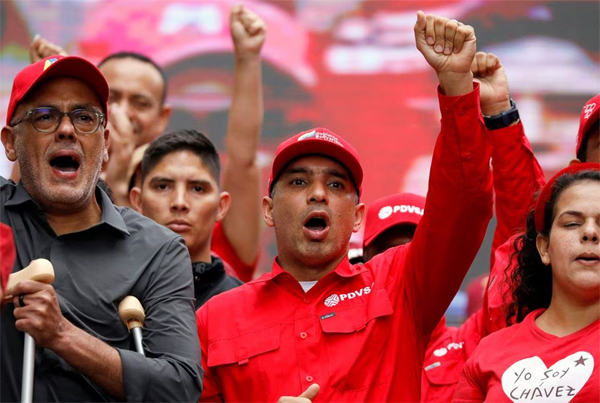- PDVSA CEO recruits young executives to spearhead overhaul
- Pledges to improve conditions for wary workers
- Lack of big company experience seen as weakness

Tibisay Romero, Deisy Buitrago and Marianna Parraga, Reuters
VALENCIA/CARACAS/HOUSTON
EnergiesNet.com 06 01 2023
The new CEO of Venezuelan state-run PDVSA is targeting endemic corruption at the financially troubled oil company while hoping to win over its 95,000 workers, a move critical to securing much needed cash for the country, home to the world’s largest crude reserves.
Pedro Tellechea, a 47-year-old mechanical engineer, took command of PDVSA in January and quickly suspended the OPEC country’s exports and reviewed sales that had left $21.2 billion in income uncollected.
Two months later, President Nicolas Maduro disclosed an anti-corruption investigation that since has led to the arrests of over 60 officials and businessmen and the resignation of the once-powerful oil minister. Among the probe’s findings: some $3.6 billion of the uncollected sales might be lost forever.
Ahead of key elections, Maduro needs a trustable and creative official capable of skirting strict U.S. sanctions to reanimate shriveling oil production, bring back investment and stop a brain drain in an industry that a decade ago provided billions of dollars per year to the nation.
Tellechea, a decorated army colonel with little experience in the energy industry, was put in charge of two of Venezuela’s most powerful institutions – PDVSA and the oil ministry – while retaining oversight of state petrochemical firm Pequiven.
At Pequiven, he brought in cash for state coffers by helping partners maintain exports amid U.S. sanctions, said Antero Alvarado from Caracas-based consultancy Gas Energy Latin America. He also led the takeover of a Colombia-based fertilizer firm previously controlled by Venezuela’s opposition.
But re-invigorating stagnant, heavily sanctioned PDVSA, which is 10 times larger than Pequiven, could take billions in investment, solid leadership, and may even require a rebound in global oil prices, say analysts.
Tellechea’s predecessors failed to restore PDVSA to financial health. Now such efforts are seen as critical for securing the country’s most important source of hard-currency revenue.
To get the job done, he has appointed young executives to PDVSA’s most critical roles, sweeping away those tied to previous CEO Asdrubal Chavez.
In May, a new board of directors presented a first plan of action with ambitious goals for this year: raising output more than 40% to 1.17 million barrels per day (bpd) of crude and 2.27 billion cubic feet per day (bcfd) of natural gas.
“Everything we plan must be carried out,” Tellechea told workers during the plan’s presentation at PDVSA’s Caracas headquarters. “Now we have a guide to recover oil production. We cannot fail.”
Tellechea’s plan, seen by Reuters, lacks specifics on how to achieve those goals. But the likelihood is slim that PDVSA will meet the lofty goals this and next year under sanctions, lack of drilling equipment, delayed investments and partners leaving the country, analysts and experts said.
“PDVSA is an archipelago of non-aligned businesses and units. Even with good intentions, all production goals mostly depend on political negotiations, U.S. licenses and achievements by joint ventures, not on PDVSA alone,” Alvarado added.
The U.S. has eased some sanctions after Maduro’s administration resumed political talks with the opposition last year. In November, it issued Chevron Corp (CVX.N) a license to expand operations and export Venezuelan oil to the U.S.
PDVSA, the oil ministry and Pequiven did not reply to requests for comment. Tellechea’s spokesperson did not reply to an interview request.
THE ‘NUTELLA BOX’
Tellechea, who understands the importance of employee support after years of work for Venezuela’s state companies, has promised to use cash from reinstated supply contracts to improve workers’ living conditions.
At Pequiven, he is delivering prized monthly foodboxes. A company retired employee who proudly displayed its content to Reuters this month on condition of anonymity, said he hopes his counterparts at PDVSA can get something similar.
The boxes contain some 50 products from meat to deodorant, which are superior in quantity and quality to the staples poor Venezuelan families receive from the government. Pequiven workers said they had even occasionally been treated to jars of Nutella, the hazelnut and chocolate spread which is a rare luxury in Venezuela.
“Tellechea has transformed Pequiven,” a PDVSA worker who requested anonymity said. “They don’t line up for food as we do, have good quality uniforms and a corporate image that we have long forgotten.”
Winning over PDVSA workers could help Tellechea achieve his operational goals while boosting the popularity of Maduro, who faces a potential election campaign next year, analysts say.
MANNERS AND REPUTATION
Among businessmen and foreign executives who have dealt with him, Tellechea has a reputation as a trustworthy official with an even temperament, a contrast with some volatile predecessors.
“He is always punctual and a decent businessman,” said an official who encountered Tellechea in dealings on a joint venture with Pequiven. “The joint venture was able to continue operating and generate stable cash even after stricter U.S. sanctions.”
Another businessman negotiating with Tellechea in PDVSA said his new executives are less confrontational and more open to drafting joint plans rather than issuing commands.
Turning around Venezuela’s energy industry, however, is a massive undertaking that could require more than one new team, experts have warned.
PDVSA’s crude output has shriveled from over 3 million bpd about two decades ago to 750,000 bpd this year amid mismanagement, a brain-drain of skilled workers and sanctions.
Some analysts say the challenge demands a more experienced chief than Tellechea, whose resume is heavier in military skills and commendations than business, according to a PDVSA document detailing his achievements.
“There is a better environment after Tellechea’s appointment,” said a refinery employee, who worried whether he will fulfill his promises over time. “As we say in Venezuela, ‘the new broom sweeps clean.'”
Reporting by Deisy Buitrago, Tibisay Romero and Mircely Guanipa in Venezuela, Marianna Parraga in Houston and Yuka Obayashi in Tokyo; Editing by Christian Plumb and Marguerita Choy
reuters.com 05 31 2023












